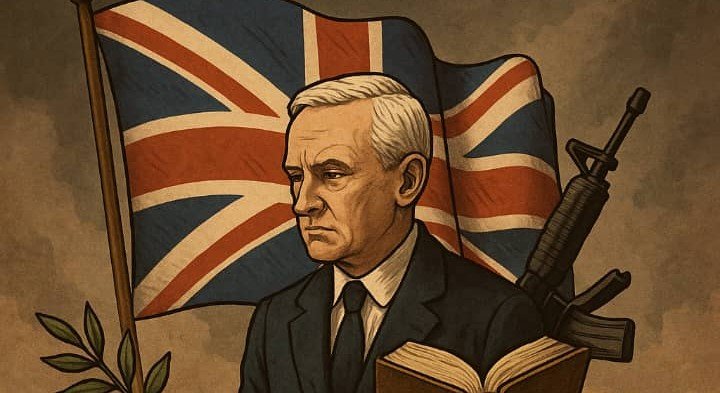By Isaac Christopher Lubogo
> “We are not the makers of history. We are made by history.”
— Martin Luther King Jr.
Introduction: A State Born in the Womb of Betrayal
As the UK declares its intent to “recognise Palestine as a state by September 2025,” one must ask: what moral currency does Britain still possess in this matter? Is this a delayed act of justice or an insidious gesture of diplomatic self-cleansing, decades too late? Is it not the very same Britain—through the infamous Balfour Declaration of 1917—that midwifed the colonial project called Israel, displacing and desecrating the indigenous Arab people of Palestine under the veil of biblical prophecy and imperial ambition?
Britain’s current shift is not a reckoning. It is an afterthought. And worse still, it is conditional.
The Historical Betrayal: The Balfour Declaration and Colonial Reengineering
In a letter dated 2 November 1917, Arthur James Balfour, then British Foreign Secretary, declared Britain’s support for the establishment of a “national home for the Jewish people” in Palestine—a land that was neither empty nor without a people. This declaration, addressed to Lord Rothschild, a British Zionist leader, was not merely symbolic—it was imperial policy wrapped in religious manipulation and colonial arrogance.
> “His Majesty’s Government view with favour the establishment in Palestine of a national home for the Jewish people…” — Balfour Declaration, 1917
At the time of this declaration, Palestine was under Ottoman rule and comprised 90% Arabs (Muslims and Christians alike). The British used religion—the Bible—as a justification for facilitating the Jewish “return,” conveniently ignoring the centuries-long presence of Palestinians. It is this same empire that partitioned Africa, carved up the Middle East, and imposed artificial borders, only now to issue “moral judgments” about who deserves statehood.
The Bible as a Colonial Weapon
Britain’s justification for Jewish return to Palestine wasn’t political alone—it was scriptural. British Christian Zionists, such as Lord Shaftesbury and later Balfour himself, cited Old Testament prophecies to validate Jewish resettlement, aligning God’s promises with imperial control. But theological manipulation masked geopolitical intent: control of a strategic corridor connecting Asia to Africa.
As Edward Said famously stated:
> “Zionism is much more than a Jewish movement; it is a European one.”
— Edward Said, The Question of Palestine
Indeed, Zionism was European in origin, and Britain facilitated its expansion—not out of penance for the Holocaust (which would come later)—but as a means to install a colonial ally in the Middle East, to dominate oil routes and divide pan-Arab resistance.
From Colonial Midwife to Silent Accomplice: Britain’s Blood-Stained Silence
Since the Nakba (Arabic for “Catastrophe”) in 1948, where over 750,000 Palestinians were ethnically cleansed, Britain has stood in a complicit silence. It did not condemn the Israeli massacres in Deir Yassin, Sabra and Shatila, or Gaza’s repeated bombardments. In fact, Britain continued to supply arms and political legitimacy.
How then, in 2025, can this same state issue conditional recognition of Palestine’s right to exist—as if sovereignty is a reward for good behaviour, not a birthright?
On Statehood: Is Palestine a People or a Bargaining Chip?
Here lies the grotesque irony: Israel was created not because Jews had a land, but because Europe had a guilty conscience. The Holocaust—an unspeakable tragedy committed by European hands—was answered by sacrificing an entirely different people. And now, recognition of Palestine comes with prerequisites and hesitations.
Let us recall:
Israel was not created through negotiation with native populations, but through UN Resolution 181, which Britain and other powers pushed through under post-WWII guilt.
Palestine, in contrast, must earn its statehood—after decades of dispossession, occupation, and siege.
> “If you’re neutral in situations of injustice, you have chosen the side of the oppressor.”
— Desmond Tutu
Weaponizing Starvation and Humanitarian Delay
Britain and its allies have not only stood by but funded the machinery of Palestinian suffering. The deliberate starvation in Gaza, as documented by Human Rights Watch and UNRWA, is not collateral damage—it is strategy. A siege. A war crime.
And now, only when global public opinion threatens their diplomatic standing, Britain offers recognition in 2025—not today—but after the dead have rotted, and only if Israel behaves. Can morality be more grotesquely inverted?
The Holocaust and the Historical Gaslighting
One cannot ignore the emerging voices questioning the weaponization of the Holocaust—not to deny its horrors, but to interrogate how its memory has been manipulated to justify another people’s dispossession.
> “To the Palestinian, the Holocaust is both a human tragedy and a political alibi.”
— Mahmoud Darwish
Are we not morally obliged to question the Western monopoly on suffering and the selective empathy that flows from it?
Conclusion: The Colonial Script Rewritten—Too Little, Too Late
Recognition of Palestine now is not a favour. It is a long-overdue correction of a historical wound authored by Britain itself. But to tie that recognition to conditions from Israel is an affront to justice. It is like an arsonist dictating how the burned house shall be rebuilt.
Palestine existed before the Bible, before Britain, before Balfour. The people of Palestine are not bargaining chips—they are heirs of a living heritage, a nation displaced but never erased.
> “You can colonise land, but never fully colonise memory.”
— Ibrahim Nasrallah
Final Provocation
Let Britain know: history has witnesses. And time does not absolve guilt. The world is watching—not to clap for delayed apologies, but to demand truth, reparations, and unconditional recognition.
September 2025 is not a moral deadline—it is a delayed confession from a coloniser whose pen now bleeds with historical amnesia and diplomatic cowardice.
Footnotes and References:
1. Balfour Declaration (1917). UK Foreign Office Archives.
2. Edward Said. The Question of Palestine. Vintage Books, 1992.
3. UN Resolution 181. United Nations, 1947.
4. Human Rights Watch. “Starvation as a Weapon: Israel’s Gaza Policy.” 2023.
5. Darwish, Mahmoud. In the Presence of Absence. Archipelago Books, 2011.
6. Nasrallah, Ibrahim. Time of White Horses. American Univ. in Cairo Press, 2012.
Signed:
Isaac Christopher Lubogo
SuiGeneris | Advocate | Philosopher | Son of Africa








